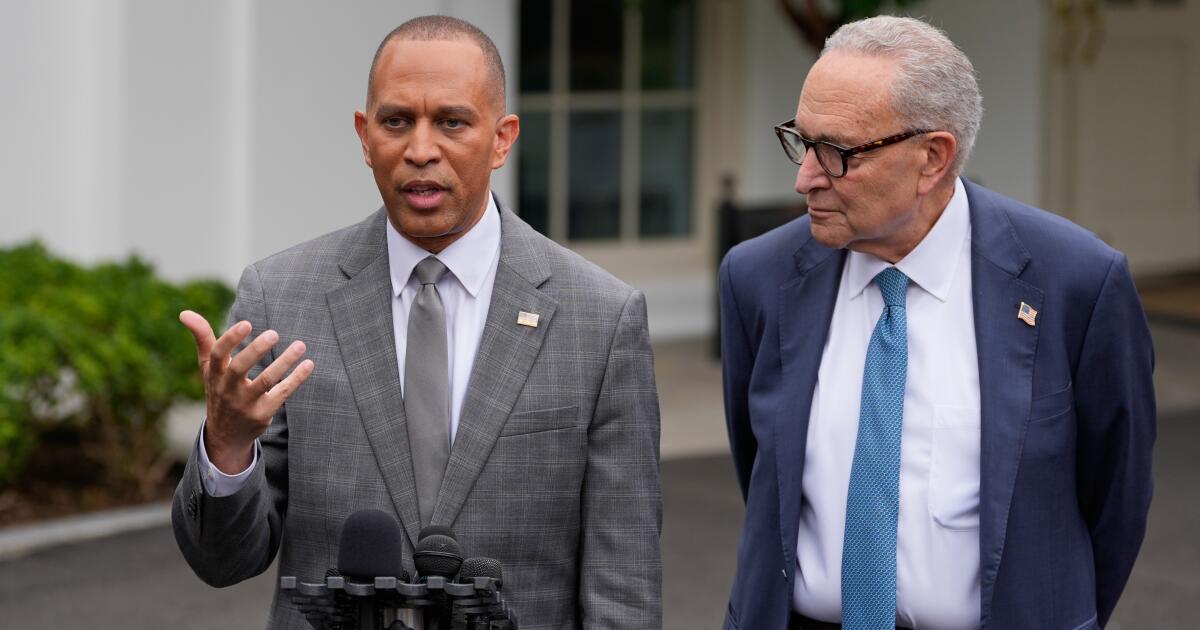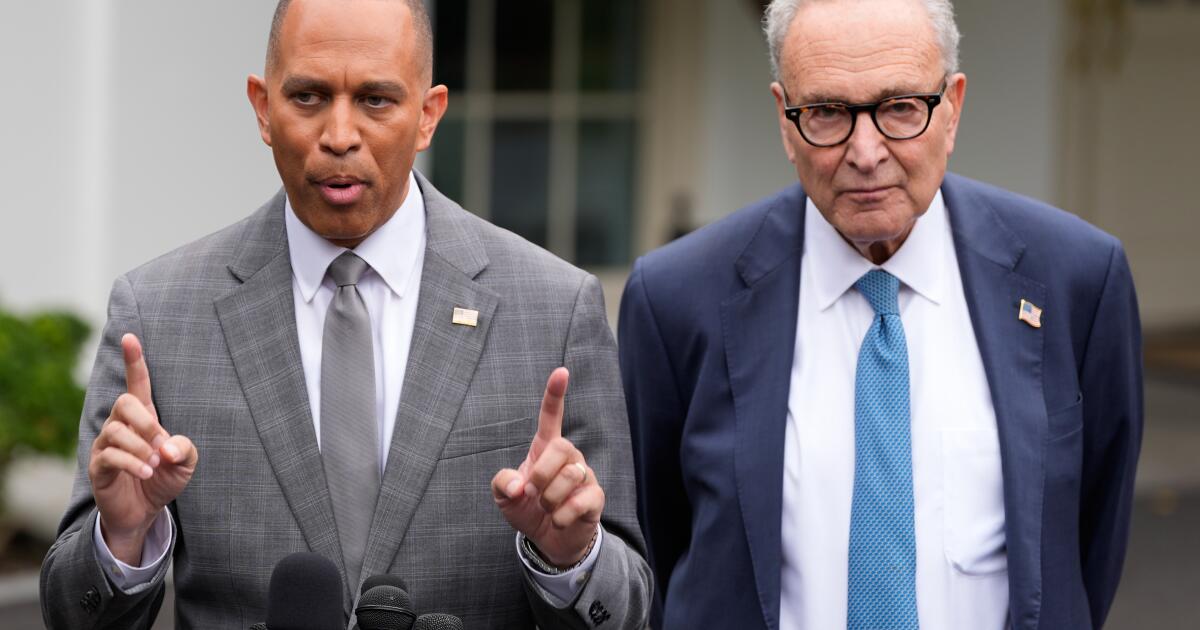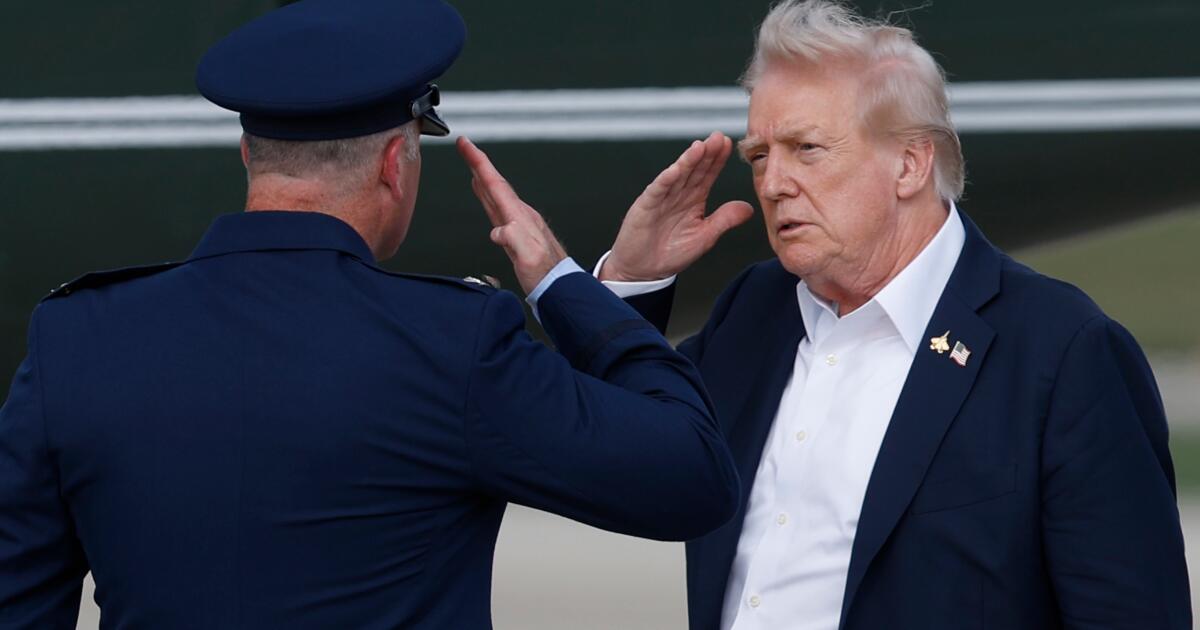The Oval Office meeting didn’t stop a shutdown, but the Trump 2028 hats and a sombrero set a tone
WASHINGTON — Halfway through President Trump’s inaugural White House meeting this term with congressional leadership days before a government shutdown, the red hats appeared on the president’s desk.
“Trump 2028,” they said, situated across from the seated lawmakers, Vice President JD Vance and several untouched Diet Cokes.
House Democratic leader Hakeem Jeffries leaned over to Vance, a potential 2028 contender, and quipped, “Hey, bro, you got a problem with this?”
The room chuckled in response.
“It was the random-most thing in the world, because we’re sitting there, we’re having a serious conversation, and all of a sudden these two red hats appear,” Jeffries recalled later at the Capitol.
“It was all so unserious,” the New York Democrat said, describing a roving cameraman capturing the moment. “We were there for serious reasons that it wasn’t really a big part of, you know, the discussion. It was theatrics.”
The moment was vintage Trump — grabbing the attention and seeking to throw negotiators off their game — but it also underscored the president’s disregard for Congress, a coequal branch of the government, and in particular his opponents across the political aisle.
From historic first meeting to viral trolling
What was once considered a historic occasion — the president of the United States convening his first “big four” meeting of congressional leaders from the House and Senate — was reduced to another viral souvenir of Trump trolling his opponent.
And after the more than hourlong session, the president failed to strike a deal with the leaders to prevent a federal government closure.
“We don’t want it to shut down,” Trump said at the White House the next day, hours before the midnight deadline.
This wasn’t just a routine meeting of the president and congressional leadership. It was the first time Trump had gathered the leaders of Congress, more than eight months into his presidency — and the first time he and Jeffries had officially met.
But more surprising was how little came from it.
Healthcare funds
During the White House meeting, Jeffries and Senate Democratic leader Charles E. Schumer laid out their arguments for saving healthcare funding as part of the shutdown talks.
Trump said very little, doing more listening than talking, the leaders said.
“He didn’t seem to know about the healthcare premiums going up so much,” Schumer (D-N.Y.) said.
With the Republican leadership, House Speaker Mike Johnson and Senate Majority Leader John Thune, the conversation ranged across their views of the healthcare situation.
“Lively,” Thune (R-S.D.) later said.
The discussion included the Democrats’ demands to ensure subsidies to help people buy private insurance on the exchanges run by the Affordable Care Act are made permanent. The subsidies were put in place during the COVID-19 pandemic and are set to expire at year’s end, which would cause premiums to skyrocket, nearly doubling in some cases.
The conversation also touched on the new rural hospital fund that is important to Republicans, set up under Trump’s big bill as a way to compensate for its cuts to Medicaid healthcare providers.
Johnson (R-La.) said Trump showed “strong, solid leadership. He listened to the arguments.”
Trying to catch the president’s attention
This is the best the Democrats could have hoped for — to have an airing before the president that began to turn the dial toward their demands. And it is what the GOP leaders had tried to avoid as each party tries to blame the shutdown on the other.
Johnson had suggested Trump back out of an initial meeting with the Democrats — after the president had agreed to one — arguing it would be a “waste of time.”
But Trump relented, and granted them Monday’s closed-door Oval Office session.
The Democrats have been here before. During Trump’s first term, the president repeatedly negotiated deals with the Democrats — “Chuck and Nancy,” as he called Schumer and then-Speaker Nancy Pelosi — to fund the government, raise the debt limit and achieve other goals.
Those bargains Trump made frustrated his party’s lawmakers.
Republicans, aware of that history, are trying to steer the conversation in a different direction, saying they would leave the door open to discuss the healthcare issue with Democrats later — once the government has reopened. They also took issue with the characterization of Trump as unaware of the depth or magnitude of the healthcare situation.
“I’m highly skeptical the president was hearing about it for the first time,” Vance said afterward.
One Republican not authorized to publicly discuss the private meeting and granted anonymity to do so said Schumer’s suggestion that Trump didn’t know about the subsidy problem was exaggerated.
So far in his second term, the president has been able to accomplish his priorities either on his own, with executive actions and the Elon Musk-led cuts that tore through federal offices, or with a compliant Congress passing his signature tax breaks and spending cuts bill, known as the “Big Beautiful Bill Act,” that is also fueling his mass deportation agenda.
But Washington doesn’t run on the White House alone, and Congress is not a majority-takes-all institution — traditionally, at least. Turning most bills into laws generally has required the give-and-take of bipartisan compromise, particularly in the Senate, and particularly when it comes to the annual appropriations needed to keep government running.
Then came the sombrero taunts
Hours after the lawmakers left the meeting, Trump’s team posted a fake video that showed Jeffries adorned in a sombrero with a faux mustache standing beside Schumer outside the White House. It was widely seen as racist.
“When I was practicing law, there was a Latin phrase that was always one of my favorites,” Jeffries said back at his office at the Capitol. “Res ipsa loquitur. It means: The thing speaks for itself.”
“We had a full airing of our positions on Monday, which should have set the baseline for a follow-up conversation from the administration to try to reignite a meaningful bipartisan path toward funding the government,” he said.
“Unfortunately, the president’s behavior subsequent to the White House meeting deteriorated into unhinged and unserious action.”
Mascaro writes for the Associated Press.


